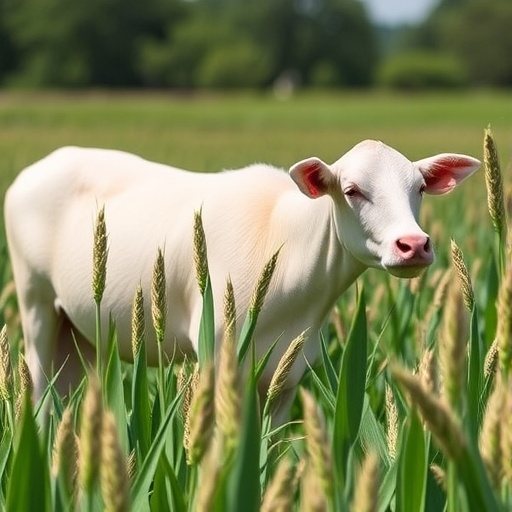In a groundbreaking study poised to reshape agricultural approaches to climate change mitigation, researchers from the University of Warwick and Cranfield University have demonstrated that genetic selection in crop varieties—especially rice—can significantly curb greenhouse gas emissions without compromising yields. This revelation is a pivotal stride in the quest to align agricultural productivity with sustainability amidst the relentless pressure to meet the global food demand.
Modern agriculture is a notorious contributor to global greenhouse gas (GHG) emissions, notably methane (CH₄) and nitrous oxide (N₂O), which are potent atmospheric pollutants that exacerbate global warming. While extensive research has long established the role of nitrogen fertiliser in driving nitrous oxide release, the intrinsic impact of plant genetics on GHG emissions has remained largely ambiguous—until now. This novel study provides the first comprehensive, global-scale comparison of how specific crop genotypes influence greenhouse gas emissions, casting a transformative light on selective breeding.
Rice, a dietary cornerstone for over half the world’s population, takes center stage in this investigation due to its unique role as both a staple food and a significant source of methane emissions. Paddy rice fields, with their anaerobic waterlogged soils, create an environment conducive to methane production by methanogenic archaea. These emissions contribute over 10% of global methane output, a gas with more than 25 times the warming potential of carbon dioxide over a 100-year timescale. The research findings underscore that certain rice genotypes inherently emit lower levels of methane, providing an unexploited avenue to mitigate climate impacts without sacrificing agricultural output.
Analyzing an expansive dataset comprising 180 crop genotypes across diverse global trial sites, the study disentangled the intertwined influences of genotype and fertiliser application on emissions. While nitrous oxide emissions were found to closely track nitrogen fertiliser usage—with little genetic variation influence—methane emissions showed strong dependency on genotype. This dissociation suggests a critical pivot where breeding programs can prioritize methane reduction strategies, a nuance previously unaddressed in climate-smart agriculture models.
Moreover, the research highlights the intricate relationships between plant physiological traits and GHG emissions. Traits such as root architecture, nitrogen-use efficiency, and interactions with soil microbiota collectively govern the greenhouse gas flux emanating from cropping systems. Varietal differences in root exudates and oxygen transport mechanisms, for instance, alter soil redox conditions and microbial dynamics, directly influencing methane production pathways. These insights beckon a paradigm shift in agronomic breeding programs, integrating environmental impact metrics alongside conventional yield and disease resistance targets.
The authors stress that optimizing crop genetics is a complementary rather than substitutive strategy to better fertiliser management. While responsible nitrogen input remains crucial to minimize nitrous oxide emissions, combining it with the cultivation of low-methane-emitting varieties could yield compounded benefits. This integrated strategy can substantially bend the carbon footprint curve of agriculture, particularly rice-centric systems, reinforcing food security and environmental stewardship simultaneously.
Dr. Alice Johnston, a leading environmental data scientist at Cranfield University and senior author of the study, emphasizes the need for expanded field trials that contextualize genotype effects on greenhouse gas emissions in real-world farming landscapes. “Our meta-analysis provides a compelling foundation, but the heterogeneity of agroecological environments demands further research to validate and operationalize these findings across varied crop types,” she remarks. Such field validation is essential to ensure that genetic gains in emissions reduction can translate into scalable, farmer-accessible practices.
This comprehensive meta-analysis represents the first global synthesis differentiating the effects of genetic makeup and nitrogen fertilisation on crop greenhouse gas emissions. The authors advocate for an urgent integration of plant genetics into climate policy frameworks for agriculture, urging governmental and institutional stakeholders to support breeding programs that embed sustainability at their core. The scientific evidence now mandates a reevaluation of breeding priorities, elevating environmental impact metrics to equal footing with traditional agronomic traits.
From an applied perspective, the potential for deploying genetically selected rice varieties with reduced methane emissions offers a tangible climate mitigation lever. Given the sheer scale of rice cultivation and its socio-economic importance, this approach can contribute significantly to national and international carbon accounting and emissions reduction commitments. Furthermore, it aligns with the United Nations’ Sustainable Development Goals, particularly those targeting climate action and zero hunger.
The study’s findings also pave the way for multidisciplinary collaborations merging genetics, soil science, microbiology, and climate modeling. Such integrative approaches are essential to unravel the complex biophysical processes underlying methane dynamics and to refine breeding algorithms for maximum environmental benefit. Additionally, advances in genomic technologies and phenotyping platforms can accelerate the identification of causal genetic loci correlated with emission traits, streamlining the pathway from research to release of climate-friendly cultivars.
Ultimately, the research ushers in a new frontier in agronomy that transcends yield maximization to encompass the broader planetary imperatives of climate change mitigation. By harnessing the genetic diversity within crop species, particularly rice, scientists and breeders can sculpt the future of farming to be both productive and sustainable. This innovative nexus between genetics and environmental stewardship is poised to transform global agriculture into a pivotal player in the fight against climate change.
Subject of Research: Crop genetics and greenhouse gas emissions
Article Title: A global synthesis of genotypic variation in crop greenhouse gas emissions under variable nitrogen fertilisation
News Publication Date: 24-Sep-2025
Web References: https://doi.org/10.3389/fagro.2025.1669002
Keywords: Agriculture, Climate change, Methane emissions, Pollutants, Agronomy, Crop science, Crop yields, Crops, Rice




